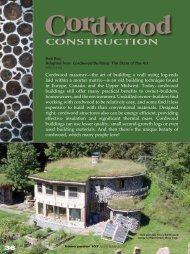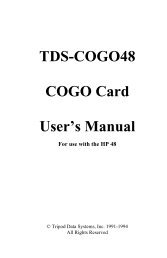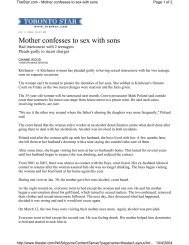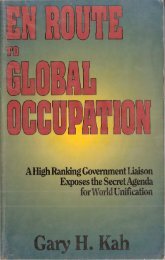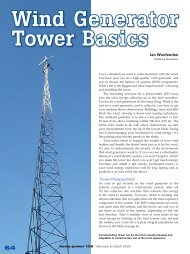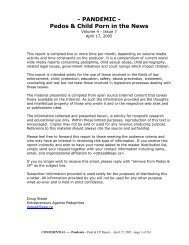G. Edward Griffin - The Fearful Master - PDF Archive
G. Edward Griffin - The Fearful Master - PDF Archive
G. Edward Griffin - The Fearful Master - PDF Archive
You also want an ePaper? Increase the reach of your titles
YUMPU automatically turns print PDFs into web optimized ePapers that Google loves.
This concept of limited government is the whole basis of the American system. By taking<br />
the chains off the people and placing them on the government, we established the formula<br />
for freedom and enterprise which has made us the envy of the world. While other nations<br />
were still laboring under a system where government officials are free to do anything they<br />
claim is in the best interests of all, American leaders had first to consult a meaningful<br />
constitution to make sure that their proposals in addition to being "good" were also<br />
constitutional. And if not, what then? George Washington answered that when he said:<br />
If, in the opinion of the people, the distribution or modification of the<br />
Constitutional powers be in any particular wrong, let it be corrected by<br />
an amendment in the way in which the Constitution designates. But let<br />
there be no change by usurpation; for, though this in one instance may<br />
be the instrument of good, it is the customary weapon by which free<br />
governments are destroyed. 10<br />
But all that was a long time ago. Today our politicians tell us that those concepts are out of<br />
date and antiquated; that these modem times demand fresh approaches and greater<br />
flexibility in order to cope with the challenge of the atomic age. Only those who have never<br />
studied the demagoguery of past ages could accept these as fresh approaches. <strong>The</strong>y may<br />
sound new, but they are the same worn arguments used to sell dictatorship to the people<br />
from ancient Rome to Nazi Germany.<br />
Arthur Schlesinger, Jr., special assistant to President Kennedy, said in a speech delivered<br />
on February 15, 1962: "Jefferson is today remote and irrelevant . . . a figure, not of present<br />
concern, but of historical curiosity." 11<br />
On August 28, 1961, President Kennedy spoke to a gathering of students at the White<br />
House and said:<br />
After all, the Constitution was written under entirely different conditions.<br />
It was written during a period of isolation. It was written at a time when<br />
there were thirteen different units which had to be joined together and<br />
which, of course, were extremely desirous of limiting the central power<br />
of the government. That Constitution has served us extremely well, but .<br />
. . it has to be made to work today in an entirely different world from the<br />
day in which it was written. 12<br />
That same year Senator J. William Fulbright, one of the country's most outspoken<br />
internationalists, made a speech at Stanford University. Fulbright was less guarded in his<br />
choice of words than President Kennedy but expressed the same views when he said:<br />
<strong>The</strong> President is hobbled in his task of leading the American people to<br />
consensus and concerted action by the restrictions of power imposed<br />
upon him by a Constitutional system designed for an 18th century<br />
agrarian society far removed from the centers of world power. It is<br />
imperative that we break out of the intellectual confines of cherished<br />
and traditional beliefs and open our minds to the possibility that basic<br />
changes in our system may be essential to meet the requirements of the<br />
20th century. . . . He [the President] alone among elected officials can<br />
rise above parochialism and private pressures. He alone in his role as<br />
teacher and moral leader can hope to overcome the excesses and<br />
inadequacies of public opinion. . . . 13


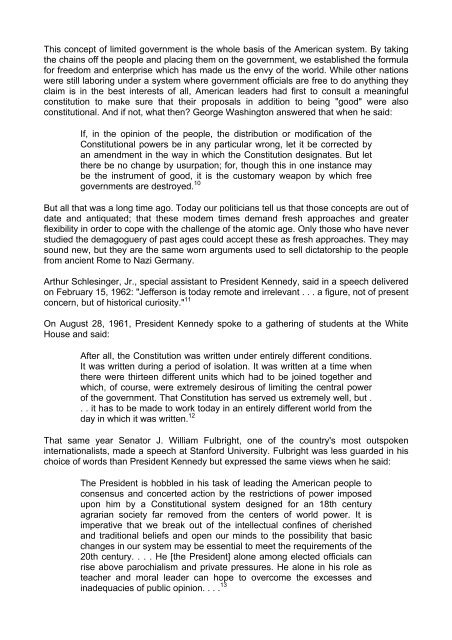
![Robert T McQuaid [rtmq@stn.net] Sent: Friday, October 29, 2004 12 ...](https://img.yumpu.com/51070071/1/190x245/robert-t-mcquaid-rtmqstnnet-sent-friday-october-29-2004-12-.jpg?quality=85)
